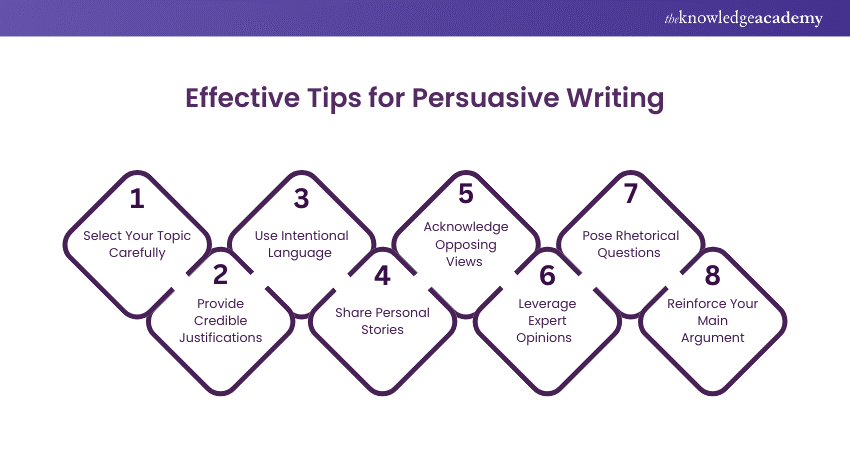We may not have the course you’re looking for. If you enquire or give us a call on 01344203999 and speak to our training experts, we may still be able to help with your training requirements.
We ensure quality, budget-alignment, and timely delivery by our expert instructors.

Persuasive writing is a valuable skill that enables you to influence opinions, inspire action, and effectively communicate your ideas. Whether you are drafting a speech, article, marketing content, or email, the ability to convince your audience can make a significant difference in achieving your goals. Mastering Persuasive Writing involves more than just presenting facts—it requires crafting arguments that resonate emotionally and logically with your readers.
In this blog, we’ll dive into eight powerful tips and techniques to sharpen your Persuasive Writing skills. Whether you're a beginner or looking to refine your approach, these insights will equip you to create compelling content that leaves a lasting impact.
Table of Contents
1) Understanding Persuasive Writing
2) The Importance of Persuasive Writing
3) 8 Effective Tips for Persuasive Writing
4) The 3 Persuasion Techniques
5) Benefits of Persuasive Writing
6) Conclusion
Understanding Persuasive Writing
Persuasive Writing make use of logic grounded in evidence, emotive language, and ethical appeals to convey an opinion or viewpoint. It can also inspire readers to take specific actions or adopt new point of view. This style of writing is often employed in professional settings, such as when drafting job application cover letters or submitting articles to industry publications.
The Importance of Persuasive Writing
Persuasive Writing offers direction on how to structure an argument and consolidate the advantages and disadvantages of a topic in a single document. Engaging in this style of writing can enhance your ability to think critically and boost your self-assurance. You can also use Persuasive Writing to gather backing for a fresh movement, like promoting eco-friendly products, or for modernising old procedures, such as implementing a new office rule. Understanding types of report writing can further enhance this skill by providing structured ways to present convincing arguments and evidence.
8 Effective Tips for Persuasive Writing
These tips will help to enhance your skills and improve your Persuasive Writing:

1) Select Your Topic Carefully
Select and explore the subject of your writing as well as the particular steps you wish your audience to follow. If you have knowledge in a specific area, you can make use of your knowledge to help you decide on a topic. The stronger your writing is likely to be, the more passionate you feel about the topic in any case.
2) Provide Credible Justifications
Provide a rationale for why you are choosing to embrace a specific point of view on a subject. Providing information about the scope and meaning of a situation can help people reach a conclusion more quickly, as they often seek to comprehend before adjusting their opinions or taking action.
3) Use Intentional Language
Use powerful verbs and adjectives, language that provokes sensations and motivates a specific course of action. Incorporating personal pronouns such as "we" or "us" can help readers feel included in the broader discussion.
4) Share Personal Stories
Personal anecdotes are short stories that demonstrate your point. You can utilise them to emphasise your evidence and evoke empathy for your point of view. Anecdotes can be useful when writing about a specific cause or promoting a product to an unfamiliar target audience, as they offer a relatable context.
5) Acknowledge Opposing Views
Offer a contrasting perspective on your topic to demonstrate the credibility of your own viewpoint. Consider researching a similarly logical perspective that is supported by others so you can effectively counter it. Readers may perceive a balanced argument as genuine, as it acknowledges the existence of differing opinions while still affirming your own stance.
6) Leverage Expert Opinions
Identify a highly respected leader in the relevant field or industry who shares your views on the topic or product. Thoughtfully include direct or paraphrased quotes from them in your arguments to bolster their credibility. Demonstrating that a well-known individual supports your stance can significantly enhance the believability of your argument.
7) Pose Rhetorical Questions
Rhetorical questions are those posed without looking for an answer. They can be used to directly engage the reader and outline a particular point. This technique encourages readers to pause and consider the writing, prompting them to form a hypothetical response and thereby engaging them with your perspective.
8) Reinforce Your Main Argument
Make sure you begin and conclude your Persuasive Writing with your main argument and a direct request for action from your audience. Ensure that your position on the topic is clearly communicated to the reader, along with your desired emotional response from them.
Turn ideas into stories enhance your writing potential with our Creative Writing Course -Register Now!
The 3 Persuasion Techniques
In Persuasive Writing, the success of your argument typically hooks on your capacity to fascinate your audience using several techniques of persuasion. These are identified as ethos, logos, and pathos. These tools aid in engaging with your audience and strengthening your argument. The means of convincing people include:
Ethos
Ethos is a persuasive method that gains audience approval by emphasising credibility. Ethos advertising methods appeal to the esteemed "character" of a speaker, presenter, writer, or brand. Examples of ethos are used to persuade the audience that the advertiser is trustworthy and moral.
Logos
Logos are the appeal to logic and reason. This persuasive method includes employing facts, statistics, logical arguments, and clear reasoning to validate your claims. By appealing to the reader's logical faculties, you make your argument more logical and interesting.
Pathos
Pathos is a persuasion technique that targets emotions. Persuasive writing usually makes use of emotional language, vivid examples, and personal anecdotes to bring out emotions of the reader. By appealing to the emotions of the reader, you can enhance the relevance and effectiveness of your argument.
Turn your words into power with our Persuasion Training. Register now for more!
Benefits of Persuasive Writing
Persuasive essay writing is a beneficial skill. It allows a writer to present their ideas clearly, in an efficient and satisfying manner.
a) Influences Opinions and Decisions: Helps shape opinions and encourages others to support your ideas or take desired actions.
b) Inspires Action: Motivates audiences to respond to calls-to-action (CTAs), whether in marketing, campaigns, or personal appeals.
c) Builds Stronger Arguments: Enhances critical thinking by encouraging you to evaluate different perspectives and create well-structured arguments.
d) Improves Communication Skills: Refines your ability to convey ideas clearly and concisely, making your messages more impactful.
e) Establishes Credibility: Strengthens your authority and trustworthiness by presenting logical, well-supported viewpoints.
f) Useful Across Multiple Contexts: Applies to various areas such as business proposals, social media, marketing, education, and personal interactions.
g) Fosters Emotional Connection: Leverages emotional appeals to engage readers and build rapport with your audience.
h) Encourages Collaboration and Support: Helps you gain allies and support for your initiatives, projects, or viewpoints.
Conclusion
Persuasive Writing is a potent skill that, once mastered, can significantly enhance your communication. By observing these tips and techniques, you will be well-prepared to create compelling arguments that resonate with your audience, sway opinions, and inspire action. Begin applying these strategies today to make your writing more persuasive and impactful.
Master your Editing and Writing Skills with our Writing and Editing Course - Sign up Now!
Frequently Asked Questions
What is the Persuasive Writing Method?

Persuasive Writing is defined as any type of written content that aims to sway the reader to adopt the author's point of view. In addition to basic writing abilities, a writer of persuasive essays can utilise personal anecdotes, logic, emotional appeal, and powerful rhetoric to sway readers
What is the Main Purpose of Persuasive Writing?

The goal of Persuasive Writing is to convince, motivate, or influence readers to adopt a particular viewpoint or position. Attempting to persuade inherently acknowledges the presence of multiple possible viewpoints on the topic.
What are the Other Resources and Offers Provided by The Knowledge Academy?

The Knowledge Academy takes global learning to new heights, offering over 3,000 online courses across 490+ locations in 190+ countries. This expansive reach ensures accessibility and convenience for learners worldwide.
Alongside our diverse Online Course Catalogue, encompassing 19 major categories, we go the extra mile by providing a plethora of free educational Online Resources like News updates, Blogs, videos, webinars, and interview questions. Tailoring learning experiences further, professionals can maximise value with customisable Course Bundles of TKA.
What is The Knowledge Pass, and How Does it Work?

The Knowledge Academy’s Knowledge Pass, a prepaid voucher, adds another layer of flexibility, allowing course bookings over a 12-month period. Join us on a journey where education knows no bounds.
What are the Related Courses and Blogs Provided by The Knowledge Academy?

The Knowledge Academy offers various Personal Development Courses, including the Content Writing and Practitioner Course, and the Creative Writing Course. These courses cater to different skill levels, providing comprehensive insights into Business Skills.
Our Business Skills Blogs cover a range of topics related to Journalism and Writing Courses, offering valuable resources, best practices, and industry insights. Whether you are a beginner or looking to advance your Business Management skills, The Knowledge Academy's diverse courses and informative blogs have got you covered.
Upcoming Business Skills Resources Batches & Dates
Date
 Persuasion Training
Persuasion Training
Fri 2nd May 2025
Fri 4th Jul 2025
Fri 5th Sep 2025
Fri 7th Nov 2025






 Top Rated Course
Top Rated Course



 If you wish to make any changes to your course, please
If you wish to make any changes to your course, please


